Focussing is an important technique for learning rules and concepts (Bundy, Plummer and Silver, 1985), and although it is not a complex technique it has received very little attention in the literature
( an exception is Wielemaker and Bundy, 1985). Our interest was stimulated by the fact that a very similar algorithm can be derived from work by Bruner, Goodnow and Austin (1956) as a psychological process of concept learning. Our current research (on intelligent tutoring systems) requires a machine learning technique which has psychological plausibility and therefore focussing was chosen as the relevant technique. The research reported in this paper was intended to develop the focussing algorithm of Bundy et al, into something more closely related to human learning. In fact, the result was a fuller understanding of the algorithm itself, along with some possibilities for psychological improvements. This paper concentrates on the discussion of the focussing algorithm itself.
CONCEPT LEARNING: ALTERNATIVE METHODS OF FOCUSSING
David J Gilmore
Centre for Research on Computers and Learning, University of Lancaster, Lancaster, England.
Focussing is an important technique for learning rules and concepts (Bundy, Plummer and Silver, 1985), and although it is not a complex technique it has received very little attention in the literature
( an exception is Wielemaker and Bundy, 1985). Our interest was stimulated by the fact that a very similar algorithm can be derived from work by Bruner, Goodnow and Austin (1956) as a psychological process of concept learning. Our current research (on intelligent tutoring systems) requires a machine learning technique which has psychological plausibility and therefore focussing was chosen as the relevant technique. The research reported in this paper was intended to develop the focussing algorithm of Bundy et al, into something more closely related to human learning. In fact, the result was a fuller understanding of the algorithm itself, along with some possibilities for psychological improvements. This paper concentrates on the discussion of the focussing algorithm itself.
